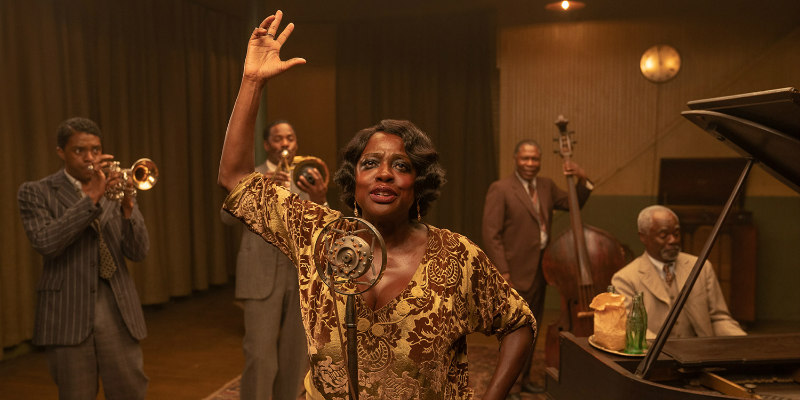
Review by
Eric Hillis
Directed by: George C. Wolfe
Starring: Chadwick Boseman, Viola Davis, Glynn Turman, Jeremy Shamos, Colman Domingo

Director George C. Wolfe's adaptation of August Wilson's 1982
play Ma Rainey's Black Bottom opens with a cinematic sleight
of hand. It's sleepy time down South, and in the moonlit woods a pair of
young Black boys run through the bush in a state of panic. Thanks to decades
of Hollywood portraying African-Americans as victims, we automatically
assume the worst, that these boys are literally running for their lives,
pursued by some angry lynch mob. But these lads aren't running for their
lives, they're running for the time of their lives. As they emerge from the
woods and into a makeshift tent, we understand just what induced their panic
- they were afraid they'd miss out on a performance by "The Mother of the
Blues", singer Ma Rainey (Viola Davis).
This transition is illustrative of the arc of Rainey's career. She began
singing the Blues back when they really were the Blues, a vocal expression
of the hardship of African-American life in the early 20th century. As her
career progressed she became a key figure in the birth of Jazz, a musical
expression of the joy of African-American life in the early 20th century. In
the 1920s she helped a young Louis Armstrong become a star, while her tour
with bandleader Tommy Dorsey made her one of the first major
African-American stars to reach a White audience. Away from the recording
studio, Rainey was known for her bisexuality, engaging in orgies with her
female backing dancers; her 1928 recording 'Prove It on Me' is considered
the first mainstream song with affirmative lesbian references in its
lyrics.

For someone who was so progressive in both her artistic and personal lives,
it's odd that Rainey is portrayed as a stubborn stick in the mud by Wilson
and Wolfe. Set in a Chicago recording studio on a sweltering afternoon, much
of the conflict of Ma Rainey's Black Bottom is driven by an
angry young man with a horn, trumpeter Levee (Chadwick Boseman).
Levee has joined up with Rainey's regular musicians - trombonist Cutler (Colman Domingo), pianist Toledo (Glynn Turman) and bassist Slow Drag (Michael Potts) - to cut a record for exploitative producer Sturdyvant (Jonny Coyne). Rainey's trio just want to play the tunes and get paid in cash, but
Levee has greater ambitions. Like many innovative musicians of the time,
he's determined to turn the Blues into Jazz, and has come up with his own
arrangements for Rainey's standards.
You only have to listen to Rainey and Armstrong's 1924 recording of 'See
See Rider' to surmise that Rainey would likely have been receptive of
Levee's ideas, but I guess Wilson decided that conflict between the
trumpeter and the vocalist was necessary to make his melodrama sing. In this
iteration, Rainey wants her songs recorded in traditional style, and grows
angry at Levee's "improvising on a theme." It doesn't help that Levee is
making a play for Rainey's current squeeze, gorgeous young dancer Dussie Mae
(Taylour Paige).

Echoing Jazz, it's the trombonist and trumpeter who clash while the pianist
and bassist maintain a steady rhythm in the background. Cutler fights
Rainey's corner and mocks Levee's notions of turning his craft into an art
form. Their bickering turns to more serious matters, like Levee's perceived
cow-towing to his White producers, and they eventually come to blows in a
heated row over the existence of God.
All of this halts in the presence of Rainey, like a teacher entering a
boisterous classroom. While the band members bow to the White producers, the
latter in turn acquiesce to Rainey, who seems to enjoy being one of the few
Black women in America to wield such power. Whether Black or White, the
drama suggests, we all have to kiss the hand that feeds us. Levee's refusal
to play the game eventually leads to dire consequences (and a final action
on his part that's a little hard to swallow).
Working with Jazz pioneers like Armstrong, King Oliver and Sidney Bechet,
Rainey was known for giving young musicians a chance. We see a glimpse of
this here in how she insists on her young nephew (Dusan Brown)
recording a vocal intro for the eponymous song, despite his struggles with a
stammer. At first this plays like a cruel joke, but Rainey's insistence that
the young boy will get it right no matter how many takes might be required
shows just how determined she was, so it's odd that the film otherwise
portrays her as so resistant to Levee's ideas.

Similarly, Davis's voice doesn't sound much like Rainey's, though she sure
can belt out a tune. The movie's highlight is a thunderous rendition of the
song it takes its title from - you really do believe everyone involved is an
accomplished musician, and it's a shame we don't get more musical
sequences.
In adapting Wilson's play, Wolfe is as resistant to innovation as his
fictional version of Rainey. Ma Rainey's Black Bottom falls
very much into the category of "filmed play" rather than screen adaptation,
too reliant on monologuing in its character development, too rigid with the
source material to improvise on its theme. Still, when you have actors as
powerful as Boseman and Davis on hand, that's not so bad. In his final
performance, Boseman is a livewire, convincingly essaying a character a
generation younger than himself. There's a sad symmetry between Boseman and
Levee, as two talents cut down just as they should be ascending.


